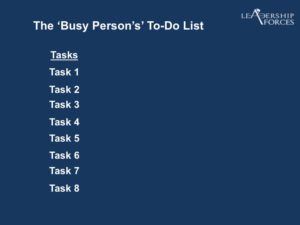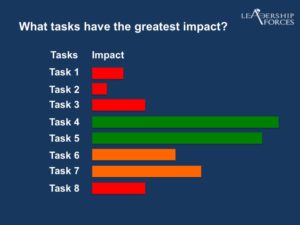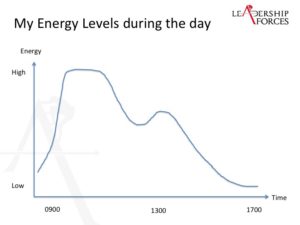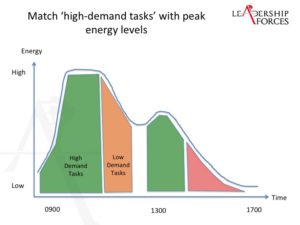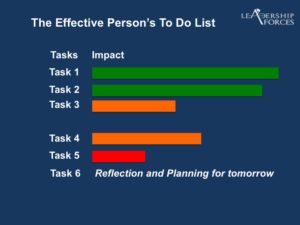If you google ‘productivity tips’, chances are you will get lots of tactical advice, hints and tips that can help you cram more into the day.
‘Tidy your desk, work fewer hours, ignore your phone or even take a nap at work.’
My personal favourite is ‘get up early’. Bill Gates gets up at 0400 and he’s a billionaire. Therefore you should also get up at 0400 if you want to be a billionaire. It’s absolute nonsense. There is no correlation between how early you get up and how successful you will be.
It’s the same with the ‘just work harder’ advice. ‘If you want to be successful, you have to hustle, you have to do more’. Bollocks. Just ‘doing more’ does not necessarily mean you are going to get where you want to go.
I think that the reason that this lands so well with people is that it’s so simple and logical that it seems like common sense. It fits perfectly with this mental model that people can work like machines. If we just do more and spend more time at work, we will get more done and that will lead us to success.
The problem with this advice is that it makes a massive assumption which I believe is usually flawed. It assumes that you’re already effective and therefore need to become more efficient.
Tip 1 – Efficiency vs Effectiveness
If you work on efficiency before effectiveness, you will smash through that ‘to do list’ and get lots of things done but many of the tasks you complete will have limited value.
If you want to have a significant impact on your productivity, you have to focus becoming effective before you become more efficient.
Effectiveness is all about doing the ‘right things’, focussing on the behaviour/tasks that have the greatest impact.
For example, many people really struggle to lose weight. They go to the gym and put in tonnes of effort but they don’t get the results that they’re looking for. One of the reasons for this is that diet is the primary driver of body composition. If you want to lose weight effectively, you have to really focus on what you eat rather than how much exercise you do. This is an example of being effective. Focussing on ‘what delivers the majority of results’ rather than the incremental changes.
Everyone has a ‘to-do list’ at work. They have a set of tasks that they need to get done. Improving efficiency means ‘getting more tasks done in the same amount of time’. It’s all about cramming more into the day.
Improving effectiveness requires you to weigh up each of your tasks and get a sense for the impact they will have. You could use a really simple weighting scale such as a 1-5 to get a sense. 5 being ‘massive impact’, 1 being ‘minimal impact’. Then you focus on the 5’s first and work your way down. If all your tasks are 5’s then you might have too much to do, but what is more likely is that you’re struggling to prioritise and/or don’t delegate effectively.
Tip 2 – Energy Levels
The next thing is to consider your energy levels throughout the day. One of the biggest failures we make is that we treat people (and ourselves) like machines. We think we can switch on and maintain a high tempo all day. The reality is different and we have peaks and troughs in energy levels throughout the day.
Below are mine, I am a morning person so my energy tends to be at it’s highest in the morning. You might be an evening person so it might look very different.
The key is to understand your own personal energy levels and match ‘high-demand, important tasks’ with peak energy periods. Cal Newport’s ‘Deep Work’ talks about the extremely high quality work you can only do when you are well rested, focussed and undistracted. In a world where a ‘notification’ (distraction) tells us whenever we get an email, our undivided attention is something that is relatively rare but that’s precisely when we do our best work.
Match high demand work with high energy. Long-term planning, writing proposals, writing articles are all tasks that demand a lot from me so I plan them in first things. Low demand tasks (emails, sending invoices, admin) all still need to be done but you don’t want to waste your most focused and productive periods on the ‘easy stuff’.
Once you’ve worked out which tasks have the greatest impact and you understand when you’re at your best, you can manage your to do list accordingly. So if you’re a morning person, it might look something like this…
Always leave time at the end of the day to reflect on the following questions:
- What did I plan to do?
- What did I do – and if there is a difference – why was there a difference?
- What did I learn?
- What am I going to do differently tomorrow?
This will give you the mental clarity to plan for the next day and create the conditions for you to steadily improve.
The reason I have focussed on personal productivity is that I believe leaders, lead by example. You’ve got to understand this first and then implement it for yourself.
Next week, I will focus on some practical tips to improve your team’s productivity.

